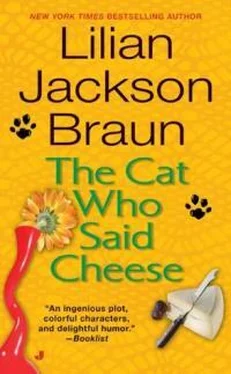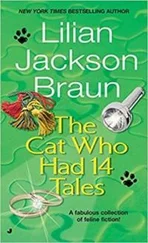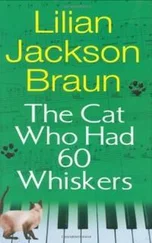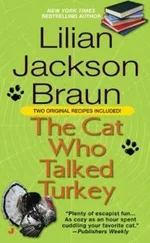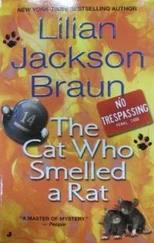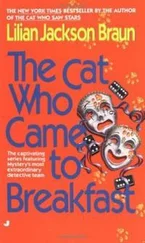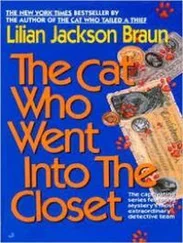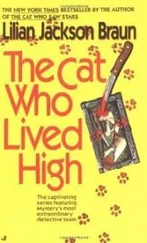"Don't worry about that. I'll mix the batter here and bring it down there. How soon?"
"Soonest."
Qwilleran went to the second balcony to wake Aubrey. The guest room door was wide open, and the guest had gone. But there were sounds of hilarity on the third balcony; he and the Siamese were having a ball.
Celia arrived with her infectious laugh and bowl of batter, and while she flipped pancakes, Qwilleran phoned the attorney.
The first thing Aubrey said to George Barter when he arrived was: "I'm gonna get me a cat."
19
In all, Aubrey Scotten told his story five times: first to Qwilleran, again to Brodie, next to the attorney, then to the prosecutor, and finally to a sympathetic judge at an open court hearing. He spoke with gravity and simplicity. The facts never varied - only the digressions about the cooking of turnips and the quality of Lois's flapjacks. Listeners were spellbound by the man's rambling tale and his ingenuous way of telling it. Onoosh Dolmathakia, the former wife of Victor Greer, made an appearance to corroborate certain details, and Nick Bamba, Aubrey's employer, vouched for his honesty, reliability, and value to the community. No charges were brought against the beekeeper, who was entrusted to the guardianship of his mother.
The "old man" in the case did not appear in court. Gustav Limburger had died, leaving a will in the hands of his Lockmaster attorney. To the surprise and consternation of the locals, his entire estate was bequeathed to a daughter in Germany.
Meanwhile, Wetherby Goode was predicting a severe winter. "We shall have snow, and what will poor robin do then, poor thing?" Merchants reported a run on snow blowers and long johns.
After the first frost nipped the air, Moose County experienced a brief but glorious Indian summer. Polly was preparing to return to the workplace, half-days, and Qwilleran was taking her to Boulder House Inn in Trawnto for a celebratory dinner and overnight.
Trawnto was a quiet lakeside resort with large old summer houses on a bluff. It had been settled in the 1800s by Canadians, ship-wrecked on the rocky shore. They wanted to name their tiny village Toronto, but local officials misunderstood their pronunciation and spelled it T-r-a-w-n-t-o in the county records.
En route to Trawnto on that festive Saturday afternoon, Qwilleran kept glancing at his passenger. "Polly, you look great! Absolutely great!" She was wearing a fuchsia silk blouse with her gray pantsuit, and it gave her face a radiant glow. "I feel wonderful!" she said. "I'm down to a size fourteen, and I'm in the mood to buy some new clothes. Also, when I return to work, I'm applying to the K Fund for public access computers. I believe we're the only library in the U.S. that still uses a card catalogue exclusively."
"I like card catalogues," he said. "I used to fantasize about being locked up overnight with the card catalogue in the New York Public Library... Why don't you also ask the K Fund for some chairs with padded seats?"
Polly said, "I've been reading about Edward MacDowell. He was a very handsome man, with a moustache just like yours. You'd look exactly like him if you'd part your hair in the middle."
"I'll do that," he replied dryly. "I've always wanted to look like a nineteenth-century composer. What else have you been reading?"
"The 'Qwill Pen.' Your column on cheese made me hungry."
"I didn't begin to cover the subject. Do you realize its importance in colloquial speech? Cheese! What a narrow escape!... Cheese it! The cops!... Who's the big cheese around here?... This is a cheesy hotel! And there are more that I won't mention."
There was nothing cheesy about the Boulder House Inn. It had been the summer residence of an eccentric quarry-owner, and it was constructed of rough boulders, some as big as bathtubs, piled one on another. Windows were recessed in stone walls two or three feet thick. The floors were giant flagstones, and the staircases were chipped out of rock.
"A house designed for giants," Qwilleran said. "I hope the food is good."
"It's advertised as nouvelle cuisine," Polly said with approval. "I suppose that means light sauces, small portions on large plates, cosseted vegetables, and glamorous fruit desserts."
"Something tells me I should have packed a lunch." When they checked in, the author of the "Qwill Pen" was greeted as a celebrity, and a hospitable innkeeper conducted them personally to adjoining rooms upstairs.
"I have a four-poster bed!" Polly announced as she unpacked her overnight case.
"I have a refrigerator!" he called back.
"I have a fireplace."
"I have an overstuffed sofa and a chess set."
They spent the afternoon walking on the beach and browsing in shops on the boardwalk, then dressed for dinner and had aperitifs on the stone terrace: dry sherry for her, Squunk water for him.
Although they had talked non-stop during the drive from Pickax, they now lapsed into tranquil silence as they contemplated the turquoise lake, the boundless blue sky with billowing October clouds, and their good fortune in being there together, in good health.
After a while Polly said, "I've missed Koko and Yum Yum."
"They've missed you, too... So have I."
"Are you still reading Aristophanes to them?"
"Yes, we're reading The Frogs. Their favorite line is Brekekekex ko-ax ko-ax."
"I imagine you read it with amphibian authority," she said.
"Thank you. I did the play in college and still remember some of my lines. The translation we used then was more poetic than the one I'm reading now, but not as humorous. In the comic scene where what's-his-name keeps saying Lost his smelling salts, my present translation reads Lost his bottle of oil, which somehow seems funnier to me. Don't ask why."
"For the same reason that a plate of sardines is funnier than a slice of bread," she said. "A donkey is funny; a horse is not. Pants are funny; shoes are not."
A large gray cat walked solemnly across the terrace, and Qwilleran said loudly, "Brekekekex ko-ax ko-ax."
Other guests looked inquiringly in his direction, but the cat kept walking.
"He doesn't understand frogspeak," Qwilleran said.
"He's hearing-impaired," Polly suggested.
"He's missing a few whiskers."
In the dining room she said she would have an amusing piece of trout. Qwilleran decided on a serious steak.
Then she asked, "Did you ever find out who surrendered Iris Cobb's cookbook?"
"No one has confessed," he replied truthfully but evasively, protecting Madame Fetter's reputation as well as Celia's cover.
"It surprised me that Aubrey Scotten's statement to the court was printed verbatim in the Something."
"Possibly the editors wanted to cool the gossip."
"Why did the bees attack the man? Was it the foul odor?"
"Who knows?" Qwilleran said with a shrug. "Bees are sensitive and intuitive creatures-and even more mysterious than cats."
"Everyone is hoping Aubrey will go back into the honey business."
"He will," Qwilleran said. "I understand his hives have been moved to his mother's farm, and he's found a new swarm of wild honeybees. He'll continue to work at the turkey farm. His mother will feed him well and cut his hair. Aubrey will be all right... Too bad Limburger didn't leave him the Bible and the cuckoo clock."
"We were shocked to hear he had a daughter in Germany. What will she do with the hotel?"
"The K Fund is negotiating with the estate for the purchase of the hotel and the house, which will make a good country inn. If the Scottens agree to sell the cabin, the inn property will extend to the river, where the bass-fishing is said to be the best anywhere around."
Accompanying the entrees were tiny brussels sprouts with caraway; spinach and toasted almonds in phyllo pastry; and an herb-flavored souffl‚, which Qwilleran pronounced excellent.
Читать дальше
